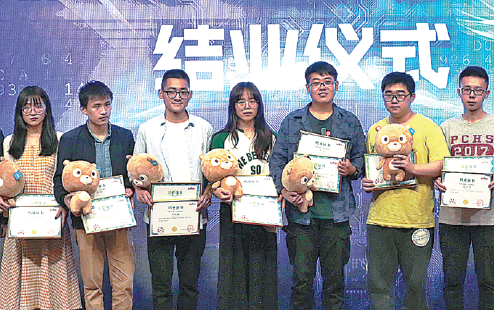Big data's big prize
 |
|
Students of Xi'an Jiaotong University get the completion certificate after a big data training course in Xi'an in April, and are taking part in this year's annual contest.[Photo provided to China Daily] |
The fifth edition of a next-generation technology competition is underway, with students from both home and abroad itching for victory, Xing Wen reports.
For Wang Bixuan, a postgraduate student from Xi'an Jiaotong University, the following five months would be intense and stirring as she itches to solve data analytics problems with her teammates at the fifth Big Data Competition co-hosted by the university and Baidu, the Chinese search engine.
This year, the annual contest is themed on "functional classification of urban areas based on satellite remote sensing images and user behaviors", and is open to applicants from universities, research institutes, enterprises and maker teams.
The contest requires each participant to design a model defining what kind of service a given piece of urban land should be intended to provide. To allow contestants to do so, as many as 550,000 samples of remote sensing images, covering 70 cities, are offered to them by Baidu
"Unlike the contests in mathematics, chemistry and biology that I have participated in before, this kind of big data competition gives me an opportunity to apply what I've learned in class and from books to solve real-world problems," says Wang.
As an electrical engineering major, she used to evaluate the performance of electrical equipment using basic big data analysis methods. Recently, she systematically started learning several programming languages and attempted to set up big data projects in fields other than her major.
"Programming for big data projects will widen my horizons and allow me to find out what I'm really interested in," says the 22-year-old.
To enter the competition, she has organized a five-member team, which includes students majoring in mathematics, automation engineering, telecommunication and electrical engineering.
She says when they are pulling together to achieve the optimal solution, thanks to their varied educational backgrounds, their skills complement one another.
Zheng Qinghua, vice-president of the university says in the competition, groups of students are asked to analyze and solve problems in a scientific way, which helps to flex their mental muscles, elevate their computational and analytical skills, all while building a strong team spirit.
"It's not only about using technology, but about developing cooperation, communication and logical thinking skills that are necessary for both their study and future career," Zheng says.
He adds the contest provides students a rich store of accessible information that is larger and more complicated than those data sets they ordinarily encounter in a classroom, enabling them to draw more practical lessons.
While more than 4,000 teams have participated in the annual event over the past four years, this is the first time the competition has dipped its toe into international waters by encouraging individuals and groups from foreign countries to participate.
The International Knowledge Centre for Engineering Sciences and Technology under the Auspices of UNESCO, as one of the competition's organizers, will also invite international panels of judges to help select contestants, as well as gather some foreign engineers and scientists to promote the event in other countries.
The contest, which started on April 30, will hold its finals in September, at which the last 16 teams will fight for the top prize.
This year's event is estimated to reach more than 300 universities and colleges in several dozen countries and regions involved in the Belt and Road Initiative, and the winners will be given the opportunity to start an internship - or even a full-time position - at Baidu, according to Li Xuanya, head of the company's campus branding department.
Since 2011, Xi'an Jiaotong University has cooperated with Baidu in cultivating people capable of using such cutting-edge technologies as big data and artificial intelligence through related workshops, training courses and contests.
Lang Qingxi, a postgraduate student at the university's school of management, considers himself as a beneficiary of the collaborative efforts made by the two sides.
Lang once joined a summer camp initiated by the company to nurture future entrepreneurs where his public speaking skills were remarkably enhanced. And, in October 2017, he attended a one-year big data training course set up by the company at his university, where he was highly motivated by his peers' spirit of assiduous study and became determined to work harder in the future.
"From these experiences, I learned how to analyze data in certain industries and then make strategic decisions according to that analysis, which paved the way for me to hunt for the ideal job position," says the 26-year-old, who has received over 20 job offers from internet companies and financial corporations by now.
Wang Zeyuan, a 24-year-old software engineering major from the university also joined the training course last year.
He says for the course, they should first study the fundamental knowledge of big data and complete some quizzes online. Then, instructed by the mentors from the company, they can work in teams and conduct big data projects to solve some relatively simple problems.
As a Go lover who once won awards at provincial-level tournaments, Wang is also eager to delve into the reason why the top Chinese Go player, Ke Jie, lost to Google's computer program AlphaGo in 2017. He says learning more about big data and AI technology is the key.
"I believe I could also improve my Go skills after understanding how the computer program works," he adds.
